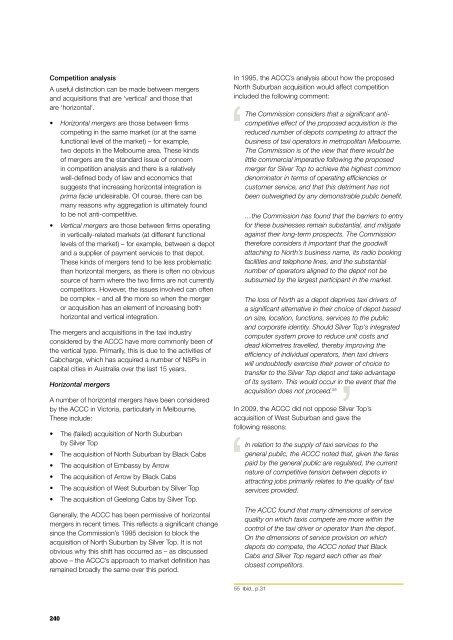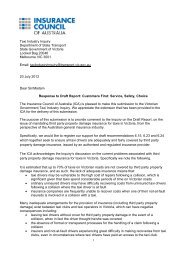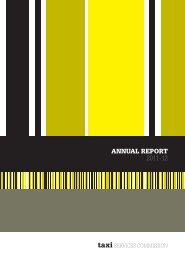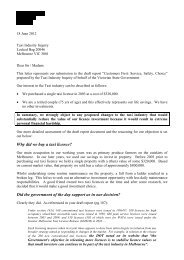Part D â Understanding and improving industry performance (PDF ...
Part D â Understanding and improving industry performance (PDF ...
Part D â Understanding and improving industry performance (PDF ...
You also want an ePaper? Increase the reach of your titles
YUMPU automatically turns print PDFs into web optimized ePapers that Google loves.
Competition analysis<br />
A useful distinction can be made between mergers<br />
<strong>and</strong> acquisitions that are ‘vertical’ <strong>and</strong> those that<br />
are ‘horizontal’.<br />
• Horizontal mergers are those between firms<br />
competing in the same market (or at the same<br />
functional level of the market) – for example,<br />
two depots in the Melbourne area. These kinds<br />
of mergers are the st<strong>and</strong>ard issue of concern<br />
in competition analysis <strong>and</strong> there is a relatively<br />
well-defined body of law <strong>and</strong> economics that<br />
suggests that increasing horizontal integration is<br />
prima facie undesirable. Of course, there can be<br />
many reasons why aggregation is ultimately found<br />
to be not anti-competitive.<br />
• Vertical mergers are those between firms operating<br />
in vertically-related markets (at different functional<br />
levels of the market) – for example, between a depot<br />
<strong>and</strong> a supplier of payment services to that depot.<br />
These kinds of mergers tend to be less problematic<br />
than horizontal mergers, as there is often no obvious<br />
source of harm where the two firms are not currently<br />
competitors. However, the issues involved can often<br />
be complex – <strong>and</strong> all the more so when the merger<br />
or acquisition has an element of increasing both<br />
horizontal <strong>and</strong> vertical integration.<br />
The mergers <strong>and</strong> acquisitions in the taxi <strong>industry</strong><br />
considered by the ACCC have more commonly been of<br />
the vertical type. Primarily, this is due to the activities of<br />
Cabcharge, which has acquired a number of NSPs in<br />
capital cities in Australia over the last 15 years.<br />
Horizontal mergers<br />
A number of horizontal mergers have been considered<br />
by the ACCC in Victoria, particularly in Melbourne.<br />
These include:<br />
• The (failed) acquisition of North Suburban<br />
by Silver Top<br />
• The acquisition of North Suburban by Black Cabs<br />
• The acquisition of Embassy by Arrow<br />
• The acquisition of Arrow by Black Cabs<br />
• The acquisition of West Suburban by Silver Top<br />
• The acquisition of Geelong Cabs by Silver Top.<br />
Generally, the ACCC has been permissive of horizontal<br />
mergers in recent times. This reflects a significant change<br />
since the Commission’s 1995 decision to block the<br />
acquisition of North Suburban by Silver Top. It is not<br />
obvious why this shift has occurred as – as discussed<br />
above – the ACCC’s approach to market definition has<br />
remained broadly the same over this period.<br />
In 1995, the ACCC’s analysis about how the proposed<br />
North Suburban acquisition would affect competition<br />
included the following comment:<br />
The Commission considers that a significant anticompetitive<br />
effect of the proposed acquisition is the<br />
reduced number of depots competing to attract the<br />
business of taxi operators in metropolitan Melbourne.<br />
The Commission is of the view that there would be<br />
little commercial imperative following the proposed<br />
merger for Silver Top to achieve the highest common<br />
denominator in terms of operating efficiencies or<br />
customer service, <strong>and</strong> that this detriment has not<br />
been outweighed by any demonstrable public benefit.<br />
…the Commission has found that the barriers to entry<br />
for these businesses remain substantial, <strong>and</strong> mitigate<br />
against their long-term prospects. The Commission<br />
therefore considers it important that the goodwill<br />
attaching to North’s business name, its radio booking<br />
facilities <strong>and</strong> telephone lines, <strong>and</strong> the substantial<br />
number of operators aligned to the depot not be<br />
subsumed by the largest participant in the market.<br />
The loss of North as a depot deprives taxi drivers of<br />
a significant alternative in their choice of depot based<br />
on size, location, functions, services to the public<br />
<strong>and</strong> corporate identity. Should Silver Top’s integrated<br />
computer system prove to reduce unit costs <strong>and</strong><br />
dead kilometres travelled, thereby <strong>improving</strong> the<br />
efficiency of individual operators, then taxi drivers<br />
will undoubtedly exercise their power of choice to<br />
transfer to the Silver Top depot <strong>and</strong> take advantage<br />
of its system. This would occur in the event that the<br />
acquisition does not proceed. 55<br />
In 2009, the ACCC did not oppose Silver Top’s<br />
acquisition of West Suburban <strong>and</strong> gave the<br />
following reasons:<br />
In relation to the supply of taxi services to the<br />
general public, the ACCC noted that, given the fares<br />
paid by the general public are regulated, the current<br />
nature of competitive tension between depots in<br />
attracting jobs primarily relates to the quality of taxi<br />
services provided.<br />
The ACCC found that many dimensions of service<br />
quality on which taxis compete are more within the<br />
control of the taxi driver or operator than the depot.<br />
On the dimensions of service provision on which<br />
depots do compete, the ACCC noted that Black<br />
Cabs <strong>and</strong> Silver Top regard each other as their<br />
closest competitors.<br />
55 Ibid., p.31<br />
240
















